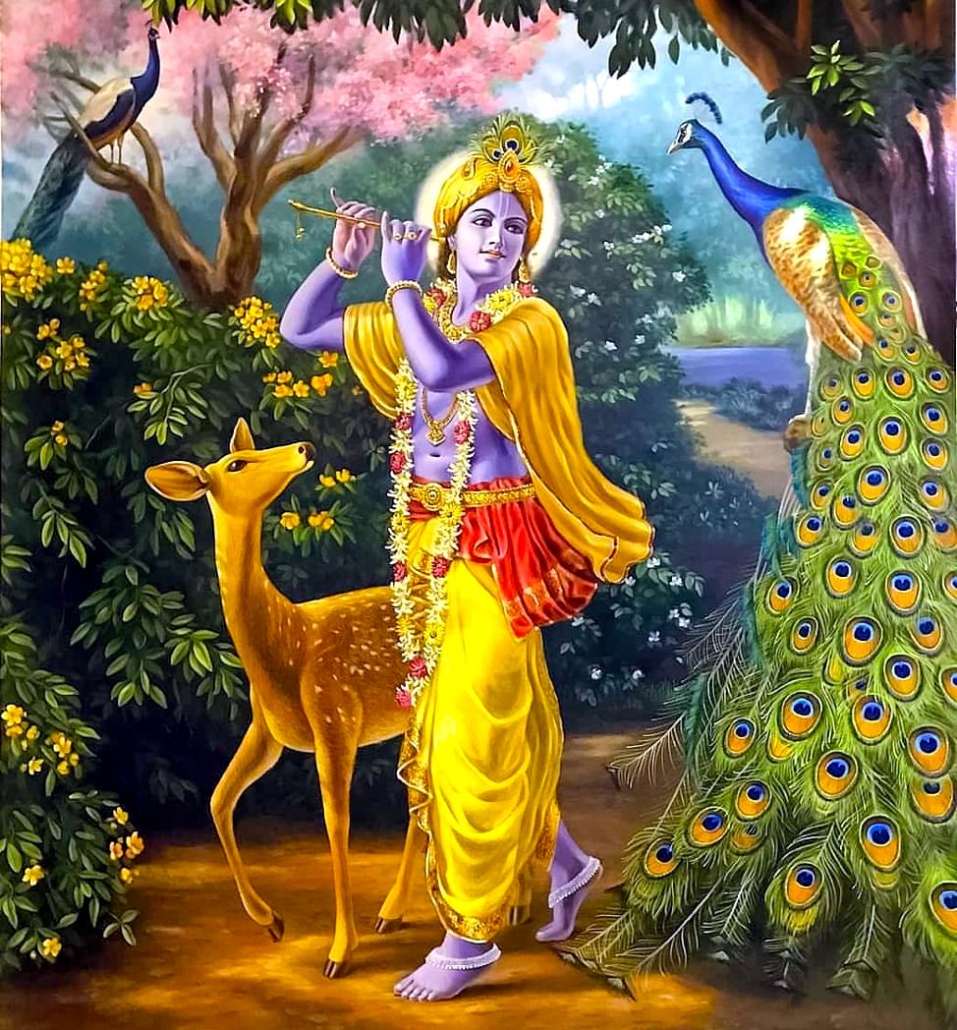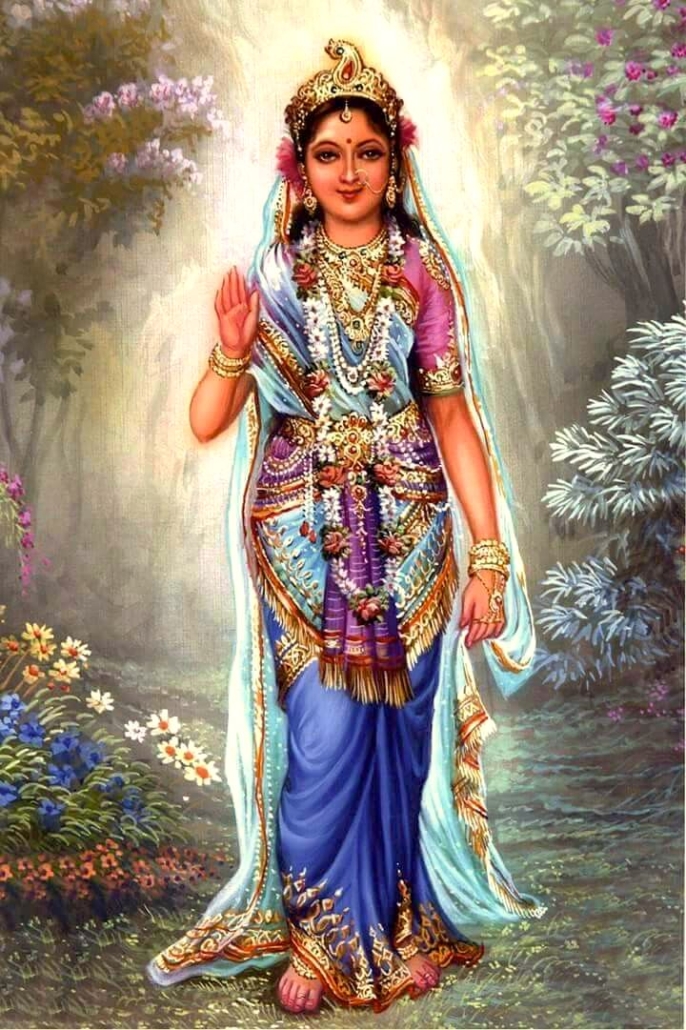Mahanidhi Madan Gopal Das
Srimad Bhagavatam is called the “king of all spiritual books” (Grantha Raja) for good reason. Within this triguna-free, transcendental treatise, the amala-purana, which showcases the absolutely selfless, divine love of Srimati Radharani, one can find all the sweet, majestic and beautiful truths about the sadhana and sadhya (daily practice and perfection) of Gaudiya Vaisnavism.
In his most compassionate and wonderful shastra, Sri Chaitanya Caritamrita, Sri Krishna Dasa Kaviraja summarizes the teachings of Sri Chaitanya Mahaprabhu and the six Goswamis of Vrindavana by mentioning the same Bhagavatam verses that they used to substantiate their sublime instructions. To emphasize the importance of these particular verses for all Gaudiya Vaisnavas, the same Bhagavatam verse is often mentioned two, three or more times in the Sri Chaitanya Caritamrta.
This series of posts presents these verses, along with selected tikas of our acharyas and the compiler. We will cover the beautiful truths, tattvas, of Krishna, Radha, Vaisnavas, Sri Guru, Bhakti Sadhana, Nama, Prema and more.
Tolerate Everything and Attain Krishna
In the beautiful Bhagavat (10.4.80), Sri Brahmaji said:
tat -te -‘nukampam -su-samiksamano
bhunjano -evatma-krtam -vipakam
hrd-vag -vapurbhir -vidadhan -namas -te
jiveta -yo -mukti -pade -sa -daya -bhak
Sri Brahmaji said, “O Krishna! One who patiently waits for You to bestow Your mercy while tolerating the reactions of one’s past misdeeds, and continues to serve You with body, mind, words, and obeisances is certainly a bona-fide candidate for liberation.” (10.4.8)
Sridhar Swamicharan tika:
The gist of this verse is: One should serve Bhagavan Sri Krishna no matter what happens. The word su-samikshamanah means, thinking when will Sri Krishna be merciful to me?
A devotee patiently accepts what destiny gives one because of past karma, and does not try to counteract it by performing severe austerities or other actions. By passing life in this way one attains Krishna and goes to the spiritual world.
Sri Sanatana Goswami tika:
The word samikshamanah means “fully expecting”. One must experience the results of past karma. That is unavoidable. Therefore, one should not be concerned about the happiness and distress that comes in this way.
The phrase hrd-vag-vapurbhir -vidadhan -namah -means that one should be attached to devotional activities and to nothing else.
Mukti-padam means either personal liberation, love for the lotus feet of Krishna, or the abode of Vaikuntha.
Daya-bhak means one who gives a gift. In other words, such an advanced devotee simply by desiring in the mind can give liberation to others.
Sri Jiva Goswamipada tika:
A devotee does not consider the happiness and distress arising from one’s karma. One offers respect to Krishna with humility and attachment, using mind, body and words in order to develop a taste for Hari-katha.
Visvanatha Cakravartipada tika:
Someone may ask, “What is a devotee’s outlook on life? How does one act?”
Brahma answers in this verse. A devotee knows that present happiness is a result of past devotional activities, and present suffering is the result of offences. Thus, a devotee peacefully endures all happiness and suffering while patiently waiting for Krishna’s mercy. A devotee knows that one’s present happiness and suffering is all Krishna’s sweet mercy.
Krishna is like the father who sometimes makes his child drink milk and sometimes makes him drink bitter neem juice. Sometimes the father embraces and kisses His son and other times He beats him. The devotee accepts whatever happens to be the arrangement of Krishna acting for one’s benefit.
The devotee thinks, “Sri Krishna certainly knows what is best for me, even if I don’t know. Karma and time have no effect on a devotee, so this is Krishna personal arrangement for me. Out of His mercy, Krishna sometimes gives me happiness and sometimes gives me distress, considering how to engage me in His service.”
The person who spends His life offering respects with body, mind and words to the lotus feet of Sri Krishna while tolerating the suffering of austerities or other hardships becomes the recipient (dayabhak) of two results: liberation from material bondage and service to Bhagavan Mukunda Sri (mukti-pada). Thus, while living in this world the devotee remains fixed on the path of devotion.
BBT tika:
Just as a legitimate son has to simply remain alive to gain an inheritance from his father, one who simply remains alive in Krishna consciousness, following the regulative principles of bhakti-yoga, automatically becomes eligible to receive the mercy of the Bhagavan Sri Krishna. In other words, he will be promoted to the kingdom of God.
A devotee earnestly awaits the mercy of Krishna even while suffering the painful effects of previous sinful activities. In his mind a devotee may still maintain the remnants of his previous sinful mentality, so Krishna removes the last vestiges of the enjoying spirit by giving His devotee punishments that may sometimes resemble sinful reactions.
Although a devotee has surrendered to Krishna, until he is completely perfect in Krishna consciousness, he may maintain a slight inclination to enjoy the false happiness of this world. Krishna therefore creates a particular situation to eradicate this remaining enjoying spirit.
This unhappiness suffered by a sincere devotee is not technically a karmic reaction; it is rather Krishna’s special mercy for inducing His devotee to completely let go of the material world and return home, back to Godhead.
Such a bona fide servant of Krishna considers all hardship a small price to pay for gaining the personal association of Krishna. One cannot approach the supreme pure, Bhagavan Sri Krishna, without undergoing a rigid purificatory process, which may appear like suffering but which is in fact a curative treatment administered by the personal hand of Krishna. Jai Sri Krishna!
Mahanidhi Madan Gopal Das comments:
In this verse, Brahmaji describes the actual mood of a fully surrendered, pure devotee of Krishna. Such a devotee does not depend upon the mercy of anyone else, because one knows that only Bhagavan Sri Krishna can make one’s human life successful.
A devotee knows that merciful Sri Krishna is just giving a token of the suffering due to one because of one’s past sinful activities. Even while suffering in this world, a devotee goes on glorifying Sri Krishna with one’s body, mind, and words. By acting in this way, one’s liberation is guaranteed. It is better to be sick and serve Krishna, than to be healthy and serve maya.
Tolerate everything and serve Krishna ki jai! Jai Jai Sri Radhe!


